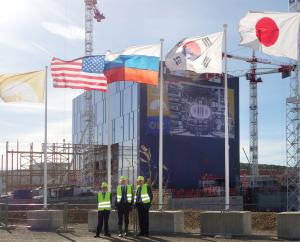Is this your first visit to ITER Headquarters?
No, but my first one in three years. And I can attest that huge progress is being made. In those days there was merely a hole in the ground with some rebar and concrete and seismic pads. On my way in this morning—we arrived just before 8:00 a.m. —I could already see cranes and workers moving around. There was a lot of activity. To see such tangible progress is very important for the morale of the fusion community.
UKAEA CEO at the age of 34 ... did this appointment come as a surprise to you?
Very much so. Governments rarely make bold decisions, but appointing me was clearly a bold decision. I think it was a conscious decision by the British Government, a demonstration of their commitment to fusion. It is a demonstration that they are thinking long term; they are thinking about putting power on the grid and actually delivering fusion power. And that is exactly what is driving me.
It is not just R&D for esoteric plasma physics—it's a focused mission, the way ahead to change the world and do something amazing. That's what drives me.
What impact will the EU referendum membership vote have for the UK fusion community?
We genuinely don't know yet. Members of the British Government are still in a mode of responding to a decision they did not expect. The government simply did not make contingency plans for the vote going the other way, so we were completely unprepared. Now, a few months on, we are still in the stage of understanding the size of the problem. But I think the situation is positive for fusion, as nuclear is high on the agenda. Our links with the broader European nuclear community pulls fusion up the agenda because civil nuclear power is important to the government.
The members of government are engaging in discussions about how to deal with the Euratom treaty, through which the UK contributes to ITER. Euratom is separate from the treaty that links the UK to the European Union, and so we are trying to communicate on the choice that we have here. We can consciously decide to remain in Euratom, or remain an associate member of Euratom.
I can't really guess what will happen in the horse-trading, but as soon as we trigger Article 50 and announce that we are leaving formally, there will then be a long period of negotiation with the European Commission. We don't know how that trading will go, but I hope that we will remain within Euratom. The entire science community in the UK, every single voice, says we are better off as part of the community. We are better off collaborating, being outward looking and engaging instead of becoming insular. This message is so consistent that I hope government will find a way to allow us to continue to participate. Not just in Euratom, but within the broader framework program.



